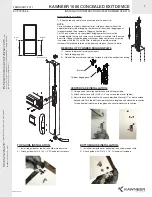
67
escription of the configuration jumpers.
D
The JP1 and JP2 configuration jumpers are placed near
of the configuration dip switch, and are accessible
by opening the terminal connector protection cover
.
The JP3 jumper is accessible by extracting the pcb
protection cover
.
Jumper JP1 allows the activation of a heater resistor
,
that prevents from telecamera window condensations
when the panel is installed in humid areas.
Check the availability of this heater resistor
.
F
actory default: disabled.
Jumper JP2 loads the installation with a communications
resistor
. F
or a proper system operation, activate this resistor
only in the closest door panel to the backbone installation
or in the general entrance door panel (if exists).
F
actory default: enabled.
Jumper JP3 selects the volume of the door panel acknowledgement
signals (call in progress, system busy and door opened).
If after starting the system it's considered that the volume is too
high, modify the jumper position.
F
actory default: maximum.
JP1
JP2
JP3
Enabled.
Disabled.
Enabled.
Disabled.
Maximum.
Minimum.
escription of the configuration dip switch.
D
escription of the configuration dip switch.
D
The configuration dip switch is accessible by opening
the terminal connector protection cover
.
Switch number 1 allows to activate the autoswitch-on function
(audio and video communication without previous call)
at the door panel that has this switch to ON position.
In systems with several door panels activate this function
only in one of them; in systems with general entrance panel
this function can be activated in one door panel of each
internal building
.
Set to ON the switch number 2 for monitor or telephones
programming
. Once the programming progress is finished
return the switch to OFF position. The programming process
is described on pages 15 (monitors) and 18 (telephones).
Set to OFF the switch number 3 in case of a master door panel.
Each system must have only one master door panel; the rest
must be slaves (ON). In systems with general entrance panel
set as master one door panel of each internal building
.
Switches number 4 to 10 set the building code. In systems with several
door panels, set the same code in all the panels; in systems with
general entrance panel, set different codes for each internal building
.
V
alid codes are from 0 (factory default) to 99. T
o
set the code use
binary coding as shown on the next paragraph.
inary coding of the configuration dip switch.
B
The switches set to OFF have null value. The values of the switches
set to ON are shown in the enclosed chart.
The building code will be calculated as the sum result of the
switches values set to ON
.
Example: 64+0+16+0+4+2+1=87
Switch number:
ON value:
4
64
5
32
6
16
7
8
8
4
9
2
10
1
Plug the EL560 module in the CN4 connector
.
The CN4 connector is accessible by unbolting
the five screws of the pcb cover protection.
Once the connector has been located, remove
the existing jumper and plug the module in.
NO
TE
: on this type of installations the EL561 module
must be plugged in all the monitors.
R
efer to the specific installation diagram.
Continue
Coming from previous page
DOOR P
ANEL INST
ALLA
TION
DOOR P
ANEL INST
ALLA
TION
ptional. EL560 module for video installations
O
with twisted pair cable.



































